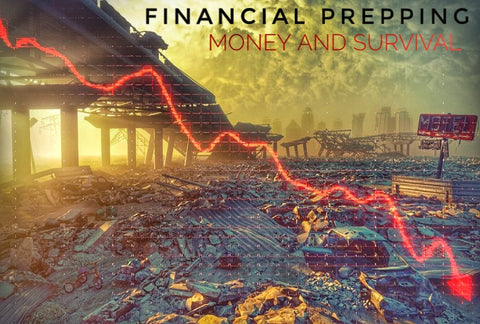How much do you invest in surviving?
Money and Prepping go hand in hand. Financial Prepping is a topic rarely discussed yet a challenge we all face daily.
Personal economic hardship, the preparation for a Life Altering Event (EMP, hurricane, civil unrest), and banking disruptions, represent the three reasons why finances should be considered as part of your overall preparedness plan.
Step one is to make a preparedness and emergency plan using our ICERS template. Before money can even be a concern, survival must be considered. Make a plan for SHTF then get your finances in order.

💰REASONS TO PREPARE FINANCIALLY
1. Unexpected vehicle repairs
2. Sudden medical expenses
3. Collapse of banking system
4. Civil Unrest and National State of Emergency
5. Job loss, death in family, birth of child
6. Government or Private seizure/freezing of funds
From a prepping perspective, financial problems increase your risk of emergencies and reduce your ability to handle them because you have fewer options and resources. Get your money in order. After paying the absolute necessities, divvy your savings (not your gross income) between the below 5 categories.
💰HOW PREPARE FINANCIALLY
1. Build a 6 month emergency fund. Determine how much the cost of living is for your family for half a year. Think only of necessities such as utilities, food, vehicle loan, medical, fuel, etc. (Set aside 50% of your savings to reach this goal).
2. Convert your currency into gold, silver, or bartering goods. Store in a secure area. These valuables will hold their worth after the dollar has become dead in the event of a national crisis. (Set aside 10% of your savings for this goal).
3. Invest in Prepping and Survival needs. Build an emergency supply cache of canned foods, batteries, water filter, dry goods, toilet paper, etc. This can be done in small steps. Each time you go to the grocery, just buy 2 extra cans of beans. Attend courses and training events to increase your knowledge in skill sets that would aid in sustainment following SHTF. (Set aside 5% of savings for this goal).
4. Invest in retirement, land, stocks, etc. Create a savings/investment account to live off of after you retire. Save up and buy land away from the city where you could be safe, self sufficient, and not need to bugout from. Research and/or hire an investment agent and put money into stocks, real estate, bonds, etc. If there are months when you can't contribute to your long-range investment goal then you need to look into not buying a soda with your meal and get water instead, cancel a streaming service (Netflix). You can save, you just need to cut out other costs. (Set aside 25% for this goal).
5. Pay down debt. Use the remaining savings to pay more than the minimum due. (Set aside 10% for this goal).
📝Contingency Tip: Don't rely on your bank. Cyberattacks and government overreach could lead to your money being unaccessible. Unless you've got funds in an account aimed at investments and interest earning, keep 75% of your savings in physical assets and cash. This means if you need $2,500/mo to pay bills and your account has $10,000; withdraw 75% of that unallotted $7,500. Keep that cash in a safe at home.
📝Prepping Tip: Spend money on prepping experiences, like a ham radio course, a survival medicine training class, range time and gun familiarization, gardening 101, etc. Spend money on Training first then gear.
📝Practical Tip: If you haven’t used something you own in the last 12 months, get rid of it! Pawn it, yard sale it, trade it.
📝Primitive Tip: Use basic skillsets to save or make money. Gather, chop, and sale your own firewood. Hunt or trap for food then eat it, sell or trade the leftovers. Collect spent brass casing from a firing range and recase your own bullets. Be an instructor of your skillset; teach your own first aid course or fly fishing session.
*This article is shared from the Grayman Briefing
CONTINGENCY FUNDS
Events in early 2022 highlighted how quickly your funds can be frozen or restricted. Take preventive steps to ensure you have the means to pay for essential services and supplies.
In Canada, citizens had their bank accounts frozen. Private financial organizations were hacked. Donors to causes had their information leaked and are subject to doxxing. Government pressured financial institutions, donation websites, and commercial entities to release information without a warrant. This was due to overreaching actions to curb peaceful protests against pandemic measures.
In Russia, private citizens lost access to pay foreign bills such as a car loan. Businesses, regardless of their approval of Putin's unprovoked war on Ukraine, are unable to conduct international financial business. Russia is losing access to the SWIFT banking system, leaving commercial entities to conduct business via fax machine. Apple Pay and Google Pay have restricted services. Citizens can't pay their Netflix bill or order goods from surrounding countries with their bank card. American Express, Visa, and Mastercard have blocked transactions. These are measures taken by Western aligned counties to deter and punish Putin for his war crimes and invasion.
Regardless of your support and opposition to these actions in Canada and Russia, the point of this blog is to bring awareness to the government's (and other entities') ability to seize, freeze, and interfere with private citizens' money.
Additionally, the 2009-2015 European Debt Crisis saw multiple countries block cash withdrawals through government order's that required banks to freeze customers from taking cash out of their banks and even ATMs.
Take action to ensure you'll have the ability to overcome unexpected interference causing loss of access to your finances. Here are some considerations when choosing a contingency method to retain a backup source of funds.
Cash- By far the best option. Withdraw half of your savings. It's likely not time to drain your accounts. Live your routine life but don't keep all your funds in a bank or investment firm. Be sure to retain what you need to pay rotating bills. Store cash at home and at least one other location such as a family members house, safety deposit box, or other cache point.
Virtual Credit Card- Generates random account number and a new token that is used to verify a given transaction. Designed to circumvent data breaches, maintain anonymity, or limit purchases.
Static, Non-Reloadable Credit Card (Gift Card)- No account or credit needed, can be purchased with cash. So long as the point-of-purchase is done securely (cash purchase) this is a great option for total anonymity. If your going to use it for online services use a VPN and throwaway email. If you’re ordering something use a mailing address that can't be traced to you directly (see our Ghost Mailing Hip Pocket Brief).
Other options- Gold, silver, cashiers check, money order, etc. Research each option. Make sure they don't expire, know trending value, understand the use of various options.
Finally, a reminder. Make a plan for basic SHTF scenarios. Download ICERS.
